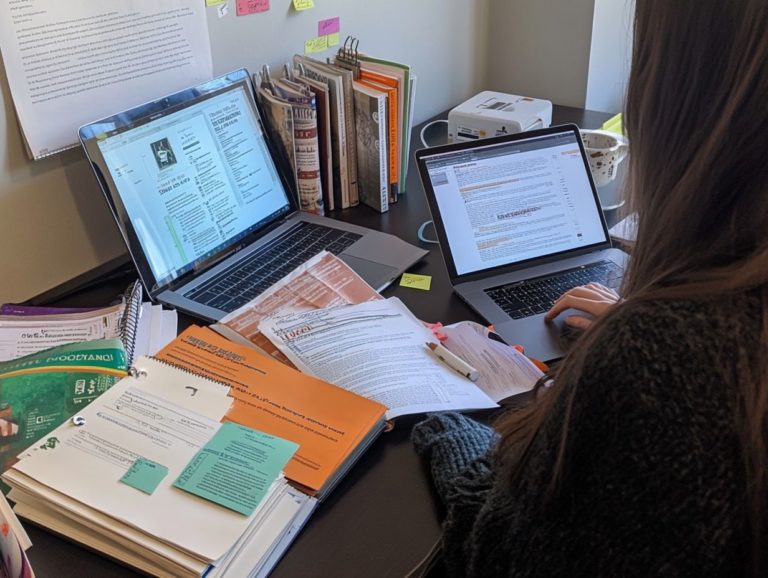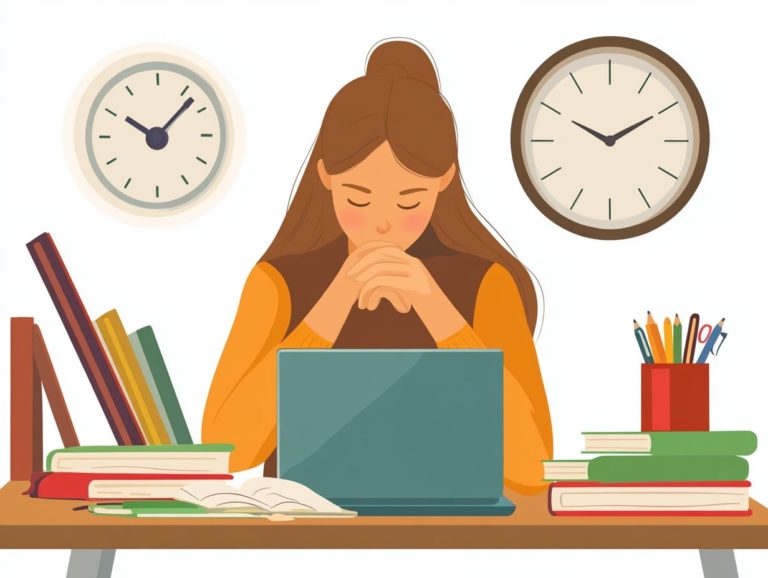what to do after completing a test?
Navigating the aftermath of a test is just as vital as the preparation that precedes it. What you do after completing an exam can significantly influence your future performance and academic journey.
This article delves into the importance of your post-test actions, highlighting the benefits of reviewing your performance, celebrating your achievements, and addressing any mistakes. It also covers effective study techniques for upcoming tests and emphasizes the necessity of self-care.
Join us to discover exciting strategies to elevate your learning experience and cultivate personal growth beyond the classroom.
Contents
- Key Takeaways:
- Importance of Post-Test Actions
- Reviewing Your Test Performance
- Celebrating Your Accomplishments
- Addressing Mistakes and Improving for Next Time
- Communicating with Your Teacher or Professor
- Preparing for Future Tests
- Taking Care of Yourself
- Frequently Asked Questions
- What should I do right after completing a test?
- Should I review my test answers immediately?
- What should I do if I finish the test early?
- Should I check my test for any mistakes?
- How should I organize my test materials after completing the test?
- What should I do if I have extra time after completing the test?
Key Takeaways:

- Reflect on your test performance by identifying your strengths and weaknesses. This will help you boost your scores on upcoming tests!
- Celebrate your accomplishments, no matter how big or small. This will boost your confidence and motivation!
- Communicate with your teacher or professor to seek feedback and understand where you can improve. This will show your commitment to learning!
Importance of Post-Test Actions
Post-test actions are crucial in your overall experience as a student, especially after demanding final exams, where stress and effort converge.
Engaging in meaningful activities after exams allows for relaxation and encourages reflection on your exam experiences.
By recognizing the value of post-exam actions, you can facilitate a balanced transition into the next academic phase while nurturing personal growth and reconnecting with loved ones.
Why What You Do After a Test Matters
What you do after a test holds significant weight, as it can directly influence your mental state and overall well-being. The aftermath of intense academic challenges often leaves you feeling exhausted and mentally drained.
It is essential to prioritize activities that nurture recovery and rejuvenation. Engaging in restful pursuits can effectively alleviate post-exam anxiety, allowing your mind to unwind.
Simple pleasures, like diving into a captivating novel or taking a stroll in nature, can facilitate that much-needed relaxation. Exploring new hobbies, such as painting or gardening, can serve as a productive distraction.
These activities not only provide an avenue for self-expression but can also elevate your mood and spark creativity. Participating in social events or community activities fosters a sense of belonging and joy.
Reviewing Your Test Performance
Reviewing your test performance is a crucial step in your academic journey. It allows you to reflect on your exam experience and evaluate your strengths and weaknesses.
This process helps you understand what went well and pinpoints areas for improvement. By doing so, you ensure that your future academic goals align with your capabilities and the challenges you face.
Assessing Your Strengths and Weaknesses
Assessing your strengths and weaknesses after an exam is essential for overcoming stress after final exams.
By engaging in self-assessment practices, you can identify areas where you excel and those that require more attention. This balanced approach boosts your confidence and fosters a growth mindset.
Strategies like journaling your reflections, seeking feedback from peers or instructors, and using self-assessment tools can enhance this process.
Ultimately, understanding your unique capabilities and areas for growth provides you with a clear roadmap for success and personal development.
Celebrating Your Accomplishments

Celebrating your accomplishments after exams goes beyond just recognizing success; it’s an essential component of personal development.
By acknowledging your achievements, no matter their size, you cultivate a positive mindset that uplifts your spirits and inspires you to set ambitious academic and personal goals for the future.
Recognizing Your Achievements
Recognizing your wins can boost your mood and energize your journey! Whether they pertain to academic pursuits or personal goals, acknowledging your achievements is crucial for nurturing a positive self-image and amplifying your motivation.
This acknowledgment lifts your spirits and acts as a powerful catalyst for future accomplishments. When you take the time to celebrate your successes, you cultivate a mindset focused on growth and resilience.
In today’s digital landscape, social media platforms play a vital role, allowing you to share your milestones with a global audience. Showcasing your achievements online not only gains validation and encouragement from friends and followers, but it also helps build a supportive community that thrives on inspiration and shared experiences.
This connection ultimately paves the way for even greater accomplishments in your journey. Start reflecting on your achievements today!
Addressing Mistakes and Improving for Next Time
Addressing mistakes after final exams is an essential step to improve your studies. This process helps you develop plans for learning from those missteps, allowing you to effectively plan your next steps with confidence.
Strategies for Learning from Mistakes
Implementing effective strategies for learning from mistakes can elevate your experience. Practices like mindfulness or meditation serve as excellent tools to help process your experiences and reduce stress.
Incorporating these techniques into your daily routine aids in emotional regulation and fosters a growth mindset. For instance, setting aside time for reflective journaling enables you to analyze what went wrong.
Engaging in calming activities, like a home spa day, allows you to unwind and gain clarity on your thoughts. By embracing practical strategies such as these, you can transform setbacks into valuable opportunities for growth.
This approach ultimately enhances your resilience and adaptability.
Communicating with Your Teacher or Professor
Engaging in effective communication with your teacher or professor after final exams is essential for gaining insight into your performance and clarifying any uncertainties. It s crucial to understand the right times and methods to seek feedback.
When and How to Seek Feedback

Knowing when and how to seek feedback is vital for aligning your academic goals with the insights you receive. Maximize the benefits of feedback by selecting the right moments for input such as right after completing a major assignment.
Crafting specific questions can steer the conversation meaningfully. For example, asking how to improve a particular aspect of your work can lead to actionable insights. Creating a conducive environment during a coffee break at an academic event can facilitate open dialogue.
Participating in structured workshops helps you network and provides hands-on practice, ultimately elevating your academic performance through the collective sharing of knowledge.
Preparing for Future Tests
Preparing for future tests requires you to embrace effective study techniques. These techniques deepen your understanding and streamline your learning process, setting the stage for academic success.
Effective Study Techniques
Effective study techniques begin with the careful organization of your study space. Create an environment that s truly conducive to learning. Pair this with practices like deep breathing to alleviate stress, setting yourself up for success.
A well-structured study area should be free from distractions, featuring proper lighting and stocked with all necessary materials. Pay attention to the ergonomics of your seating arrangement comfort is key during long study sessions.
Incorporating breaks into your study routine can significantly enhance focus. Consider taking quick walks or engaging in mindfulness exercises during these pauses.
Implementing relaxation strategies like deep breathing not only calms your mind but also boosts retention. By weaving together these diverse techniques, you cultivate a balanced approach that enhances both your academic performance and mental well-being.
Taking Care of Yourself
Caring for yourself in the aftermath of final exams is essential. It helps you recover and feel better both mentally and physically.
Prioritizing self-care during this time can significantly enhance your overall health and restore your energy levels.
The Importance of Self-Care After a Test
Self-care after a test is crucial for you to rest and recharge. Consider various options, such as outdoor activities or a home spa day, to unwind.
These practices not only alleviate stress but also promote your emotional and physical well-being. Engaging in activities like hiking in a nearby park or enjoying a leisurely bike ride can invigorate both your mind and body.
A cozy day indoors might also help you recharge, complete with your favorite movies and calming teas. Incorporating mindfulness being aware of your thoughts and feelings in the present moment through techniques like yoga or meditation can enhance your relaxation and help you reconnect with yourself.
Exploring creative hobbies, whether painting or crafting, can serve as a delightful distraction while fostering recovery and rekindling a renewed sense of purpose.
Frequently Asked Questions

What should I do right after completing a test?
After completing a test, take a deep breath and relax. It’s important to give yourself a moment of rest before moving on to what to do after taking a standardized test.
Should I review my test answers immediately?
It’s a smart move to take a few minutes to review your test answers after completing the test. This helps you catch any mistakes or make last-minute changes.
What should I do if I finish the test early?
If you finish the test early, use the extra time to review your answers or go over any questions you might have skipped. You can also double-check any calculations or equations.
Should I check my test for any mistakes?
Checking your test for mistakes is a smart move! This includes looking for spelling and grammar errors, as well as verifying the accuracy of your answers.
How should I organize my test materials after completing the test?
After completing a test, it s important to organize your materials before leaving. Put away your pencils and erasers, stack your test papers neatly, and ensure you have all your belongings.
What should I do if I have extra time after completing the test?
If you have extra time after completing the test, review your answers or tackle any questions you struggled with. You can also make final edits or simply relax and take a break.
Remember, taking time to care for yourself after a test is as important as the test itself!






